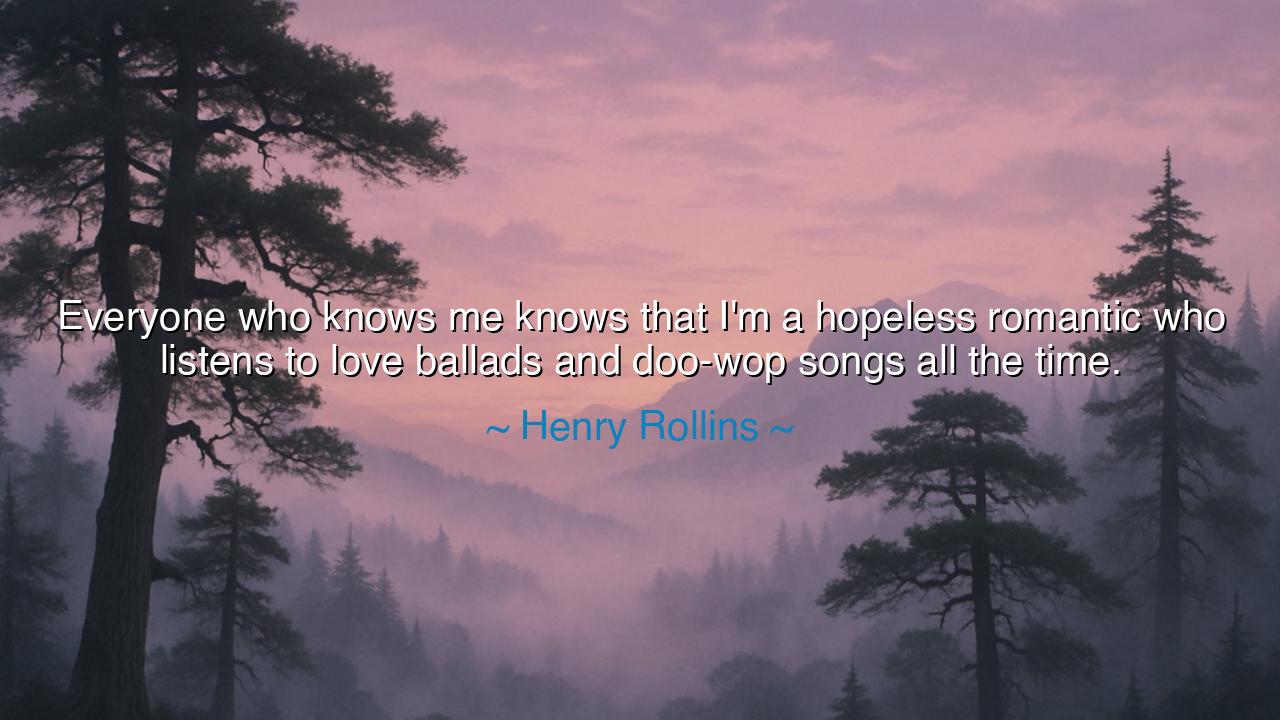
Everyone who knows me knows that I'm a hopeless romantic who
Everyone who knows me knows that I'm a hopeless romantic who listens to love ballads and doo-wop songs all the time.






Henry Rollins, fierce in voice and fiery in spirit, once laid bare a gentler truth of himself: “Everyone who knows me knows that I’m a hopeless romantic who listens to love ballads and doo-wop songs all the time.” In this confession we find the paradox of humanity—that within the warrior beats the heart of a dreamer, and behind the iron visage lies a soul that longs for tenderness. The man who stormed stages with thunderous words admitted that he was, at his core, a hopeless romantic, seeking solace in melodies of longing and devotion.
The origin of this declaration springs from a timeless truth: that music has always been the vessel through which the human heart pours its deepest desires. From the chants of ancient temples to the ballads of medieval minstrels, from the doo-wop harmonies echoing in city streets to the whispered serenades of lovers, the soul has always sung of love. Rollins, a man born into the harshness of punk’s rebellion, reveals through his words that even in chaos, the heart cannot silence its craving for romance, for songs that speak of tenderness, devotion, and the eternal search for connection.
Consider the story of Abraham Lincoln, a man often remembered for his stern countenance and grave duties. Yet beneath that steel exterior was a soul that wept at poetry and sought comfort in sentimental songs. During the darkest days of the Civil War, Lincoln would request musicians to play simple ballads of love and longing, and in them he found the strength to carry the burdens of a fractured nation. Even the mighty, like Rollins and Lincoln alike, reveal that within their strength lies the sustaining power of tender melody.
The deeper meaning is this: to be a hopeless romantic is not to be weak, but to be profoundly human. It is to carry within oneself the knowledge that life’s victories are hollow without love, and that the heart, though scarred, is still capable of dreaming. The love ballads and doo-wop songs Rollins embraced are not trivial indulgences—they are reminders that amid the noise of the world, harmony can still be found, and amid despair, the promise of love can still rise like a dawn.
Beware, however, of the world’s scorn. The cynic will laugh and call romance foolishness, the hardened will dismiss music as sentiment. Yet it is the romantic heart that builds bridges where walls once stood, that sings of hope when silence would be easier, that chooses vulnerability over pride. The world may think it safer to close the heart, but safety without love is nothing but a gilded cage. The true strength is found in the one who dares to remain open, even while battered by disappointment.
The lesson for us is simple yet profound: let not the fire of romance be extinguished within you. If you are moved by a song, do not resist the tears it brings. If your soul stirs at the sight of devotion, do not bury that stirring beneath mockery. Instead, cultivate it. Sing the songs that move you, even if the world calls them old-fashioned. Cherish the tenderness within you, for it is the source of your greatest humanity.
Practical counsel follows: set aside moments each day to nourish the romantic spirit. Listen to the songs that awaken your heart. Speak the words of affection that you have long withheld. Write letters, give small gifts, remember anniversaries, tell someone you love them without fear. These are not small things—they are the very essence of life. As Rollins showed, one may carry the armor of a fighter, yet still live fully through the songs of the heart.
Thus we see the wisdom of Henry Rollins’s words. To be known as a hopeless romantic is not shameful, but glorious. It means to live with the courage to feel, to hope, and to love in a world that often forgets the music of the soul. And so, O children of tomorrow, let your lives be filled with melodies of love, until your own hearts, like Rollins’s, sing in harmony with the eternal song of tenderness.






AAdministratorAdministrator
Welcome, honored guests. Please leave a comment, we will respond soon